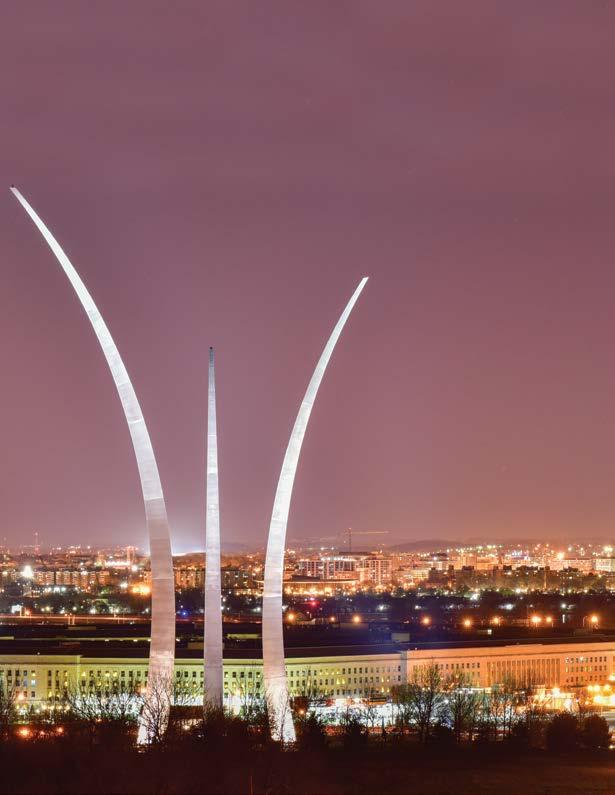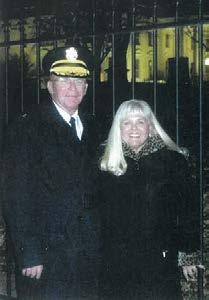
8 minute read
God's Man in the Pentagon
with Chaplain Stephen Show
Chaplain Stephen Show retired in 2015 after a distinguished career in the United States military. Chaplain Show has served in the Air Force and Air National Guard from 1976-1981, then became an Army Chaplain Reservist from 1986-2015, spending the last 9 years on active duty in the Pentagon. Ultimately, Chaplain Show ended his military career as a full Colonel in the United States Army. But for 25 of those years, Chaplain Show was also a pastor in Churches of God churches, like Kingwood and Lillyville in the Allegheny Region. We wanted to continue our discussion from our last issue about the impact that chaplains are having in our denomination, so we asked Chaplain and Pastor Stephen Show to tell us his story, and what it means to serve God and country.

Can you give us a brief overview of your chaplaincy ministry?
I was commissioned on 31 January 1986; I was commissioned as a First Lieutenant in the United States Army Reserve. I was serving the Kingwood Church of God from May 1982 through February 1988, as the pastor. I served the Chemical Battalion in Johnstown Penn as the Battalion Chaplain.
We moved from Kingwood Church in 1988 to Lillyville Church of God, to pastor there, also in the Allegheny region. I was still serving the Chemical Battalion when we moved. Then I received another assignment to an Artillery Brigade in Pittsburgh in 1990. I was there from 1990-1995, then I served as the Battalion Chaplain from 1995-1997 in a Military Police Battalion in Pittsburgh. From 1997-2002 I was reassigned to a Quarter Master group in Farrell, Pennsylvania. With this reassignment to Farrell, I was responsible for units in five different states. Still, I was pastoring Lillyville Church while serving those units. I was responsible for supervising five different Chaplains in five different states.
As a pastor and an Army Reserve Chaplain you have a congregation, but you also have a responsibility to five other Chaplains, their units, their commanders, and everything that is involved in that. Every step of the way as a Chaplain, more responsibility is given, and that requires taking on more leadership and training for younger chaplains.
I was reassigned in 2002 to the headquarters of the 99th Regional Readiness Command in Pittsburgh. I was mobilized in 2003 until 2005, and in 2003 I resigned from Lillyville after 15 years of being their pastor. It was a new chapter of ministry for me, and the people of Lillyville were thoroughly supportive. Obviously, they were sad to see us go, and we were sad to leave, but they were supportive of our new adventure.
I was mobilized in Pittsburgh on active duty and served there from 2003-2005. I was then mobilized in Germany as a Chaplain to support Operation Enduring Freedom. I was there for almost a year, from 2005-2006, and then in 2006 I was assigned to the Pentagon to the Army Office Chief of Chaplains where I served in a mobilization and operations position. I was at the Pentagon from 2006 to 2015, and I retired on 30 September 2015.
What role did other Chaplains play in your journey?
Dr. Saloom was our family physician, and a doctor in an Army Reserve unit in Pittsburgh. He was instrumental in mentoring me and providing the opportunity to become an Army Chaplain. I owe my career to him. Even though he wasn’t a chaplain, I have a tremendous amount of respect for him. He also helped mentor me in the Army. The Air Force and the Army are two different worlds, but Dr. Saloom taught me how to conduct myself. I really appreciated that in the long term.
There are a couple of people in my time pastoring with the Allegheny Region while serving as a Reserve Chaplain, to whom I owe a debt of gratitude. The first one is Barry Walker. He was my first supervisor and Chaplain; he helped me get my education on track that the military required. The second person was Ernie Knoche. He helped me develop as the leader that Chaplains should become. His mentorship is unsurpassed. Without Earnie Knoche I could not have done what I did.
Gary Johnston was also a huge mentor for me when I went to the headquarters in Pittsburgh. Without Gary, at that level of command, I would not have had the level of success that I did. Each of these people were absolutely crucial to my career.
Another mentor was Larry Racster. He was an Army Reserve Chaplain for 35 years. He was working at the Pentagon in 2005, and it was because of him that I got the job at the office. He knew what it was like to serve the church, balance your life, and Larry saved my life many times over. The Pentagon’s a big place. One wrong move and you can be in a lot of hot water.
All along the way in my career, God has put these people in my life. Those things, I think we overlook for a long time, and then it hits you one day, how much you owe to people. Those people in my life, I just owe a lot to them. And I would be remiss without mentioning their names. All of my life people have mentored me, in the church and chaplaincy. I wouldn’t be here without them.
What are the main duties of a military Chaplain?
There are three things that every Army Chaplain does. They nurture the living, they care for the wounded, and they honor the fallen. As an Army Chaplain, every single one of us, those are the three core competencies. Regardless of who sponsors you, or your denomination; nurture the living, care for the wounded, and honor the fallen. That’s our commitment to the uniform.
Nurture the living: That might be the counseling, or a worship service.
Care for the wounded: I think about a combat-oriented situation. The physical presence of a Chaplain in a combat station is extremely crucial, to let them know that God is there with them.
Honor the fallen: I participated in grave side funerals, ministering to the families that might be in your unit. But the common denominator of a Chaplain is to honor the fallen and reach out to their families. I’ve folded the flag at a funeral ceremony. Things like that are where Chaplains are always in the mix.
What is the most difficult part of military chaplaincy?
The most difficult thing is the balance between being a Chaplain and an officer. In the Army, you’re a Chaplain first, a staff officer second. That’s why they put the title of the Chaplain first, and then the rank second. You are a person of God first, and a person of rank second. It’s very difficult to keep that straight. Sometimes Chaplains want to reverse that and become too heavy in the officer category and a little too light in the Chaplain category. Especially as you climb the structure of rank. You get into levels of leadership where the temptation is: I’m an officer, and the Chaplain gets overshadowed. You don’t want to overshadow either, but the priority is Chaplain first. That was the most difficult thing in my entire career.
You have to rely on God to help keep the priorities straight as a Chaplain.
What happens if we get that priority wrong?
Soldiers lose their respect for you. Now you’re an officer and not a Chaplain. They don’t see a captain; they see a Chaplain. Well, if you become too heady, they see an officer and not a Chaplain. Officers sense that too, you lose that sense of respect. I’ve seen it happen. Someone gets promoted, and they become a different person. They’ve changed. You can’t minister to your soldiers if they’ve lost respect, and you can’t be a Chaplain in that unit anymore.
It was at the training meetings where I was able to get to know the soldiers, and I gained their respect. They would reach out to me a month later, ask me to do their weddings, just from being a Chaplain during annual training when I let them know God cares for them. When you become more of an officer, you can’t do that. When soldiers lose their respect for you, you have no accessibility to them. That balance of rank and of spirituality, it’s difficult.
I was a full colonel in 2008. That carries a certain level of power to it. We had a situation that we had to fix. I had my office partner Larry Racster tell me. “Look Show, we have to fix this, and were going to have to do it in such a way that you remember that you’re a Chaplain when we do it. People saw the rank on my collar, but I also represent God. And there were times where I had some very intense conversations because [people] were not executing what they needed to, and I had some of the best relationships with those officers after that encounter, because I went in, praying and remembering who I really was representing.
How can the CGGC best support Chaplains, military or otherwise?
Without denominational support, Chaplains don’t exist. Bottom line. It’s a hand and glove kind of a thing.







